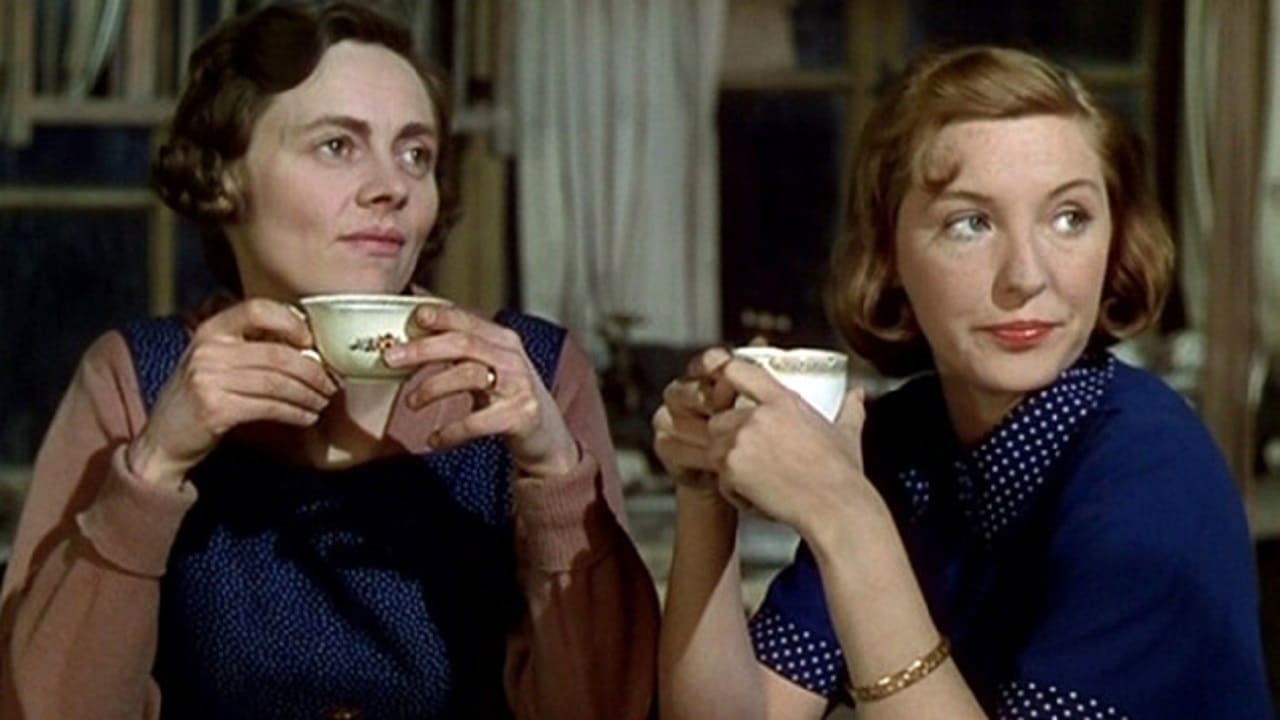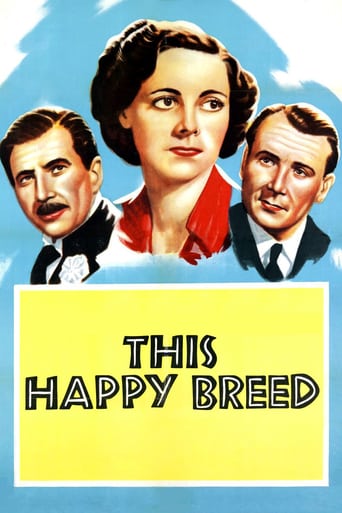

Who payed the critics
... View MoreI didn’t really have many expectations going into the movie (good or bad), but I actually really enjoyed it. I really liked the characters and the banter between them.
... View MoreEasily the biggest piece of Right wing non sense propaganda I ever saw.
... View MoreBlistering performances.
... View MoreAs others have said, the story follows the Gibbons family in Clapham from 1919 to 1939. The central characters (the parents) are played stunningly by Robert Newton and Celia Johnson. Mr Gibbons is a bit like Polonius - always coming out with rather cliché'd advice. But his children hear his warmth and concern and support - which is what really matters. Mrs Gibbons is more acerbic and constantly trying to stop the others rowing.The old mother and widowed aunt are brilliant. Coward gets in some superb satire of both hypochondria and Christian Science (the aunt switches tack halfway through the story).I enjoyed the technicolour, because the clothes are PERFECT. For anyone interested in fashion history, this film has everything. The old mother, like Queen Mary, never updates her look from before WWI, favouring long skirts and "toques" (see Queen Mary's hats). The aunt is always slightly behind the times. Only Kay Walsh is slightly out of period - her Charleston dress has a waist! Tsk, tsk. And she can't quite bring herself to adopt the dated hairstyles that must have seemed frumpy to her. She's brilliant in her part, though, complaining that her family are "common".The left-wing views of the son, Reg, and his friend are sent up, but at the time it was the communists who fought the fascists, and the boys get beaten up in a clash with Mosleyites.Just one point - other reviewers from the States have called the family "middle class". This may be confusing for Brit readers - their classification is different! They are lower-middle-class: hard-working and aspirant. I've forgotten what Mr Gibbon's job is, but somehow it supports a house, three children, two relatives, a cat, and a maid. However, maids were cheap back then, and one woman couldn't have done the work of a house that size.We're told, however, that she gets help from her daughters (though not the parasitic relatives). The maid is a bit caricatured - maids were stock comic characters in 30s plays - but she is treated as one of the family and Mr G even helps her fold the tablecloth.The family don't exactly speak Cockney, just a bit "common". By the way, Noel Coward was not "patrician". Didn't he grow up in a family and house like this? He invented his aristocratic persona and accent. I don't think anybody really talked like thet!
... View MoreThis film is set between the wars and spans roughly 20 years. WWI has just ended when the film begins. The man of the house is back from fighting and the family is moving into a new home. Soon, you start to realize that this 'typical' English family is darned annoying! Now I know this is considered to a very good film and has a very respectable overall score, but listening to the grandmother and aunt prattle on and on and on throughout the film grated on me--and was hoping that someone would toss them out or hit them! And, as the teenagers grew into adulthood, they, too, often became annoying brats. And it made me wonder...was the supposed to be a film to bolster the spirit of the Brits or make you sympathize for the enemy?! After all, aside from the nice but ineffectual mother and father, they were a pack of jerks! And, as the film inexorably moves through the next decades, some of the folks don't improve--the granny and aunt are STILL obnoxious. The idiot kids (especially the one daughter) eventually turn things around...but it sure takes too much of the film! Heck, I could see the Axis using this film to show the German people to persuade them how weak and annoying the Brits were (which they are NOT--but the film sure makes it seem that way).While I KNOW that David Lean is one of the gods in the film world, I really think this one is a huge disappointment due to characters who seem more like broad caricatures instead of real folks and a story that bounces through so many years that you rarely feel connected to the characters. I think that Mr. and Mrs. Gibbons (the parents) were wonderfully written and the idea of a story of the working class on the outbreak of WWII is great--but something is missing from this one. Episodic and tough to believe at times, you don't expect a Lean film (and his first color one to boot) to be this mediocre.
... View MoreA decent second film from David Lean, who would go on to direct some of the greatest films of all time. As with his other early films, Lean's material is a Noel Coward play. The film follows the lives of a middle class family between the Wars. As this film was released into a Britain battling overseas, it seems to be encouraging solidarity on the homefront, and the holding up of middle class values. But this is different from usual Noel Coward, and it's message is a little confused. One male character's liberalist ideas are seemingly stultified by a wife and kids, and he's encouraged just to live a normal, somewhat dreary suburban life. Spoiled daughter Queenie (Kay Walsh) wants to ascend to the upper class and live rich, but she meekly marries sailor John Mills (too old for the role, but still good). Coward seems to be virtually discouraging any movement out of a quiet suburban stratosphere. Every character seems to have to settle for what they don't want.Celia Johnson (who would give one of the greatest female performances of all time in Lean's later "Brief Encounter") is excellent and very authentic as the mother. Robert Newton proves he can be subtle as well as eye-poppingly grandiose in his portrayal of the patriarchy of the family. Ronald Neame's Technicolour is very nice, but it lacks any atmosphere or particular "look" to it. I prefer the black-and-white mastery of "Brief Encounter", "Great Expectations" and "Madeleine". I liked the film, but there is nothing particularly interesting about the characters and it all just hums along. Better things were to come from David Lean in later years.
... View MoreHas anyone else had the feeling that a young Lennon and McCartney were influenced by Coward and Lean?The scene where Queenie leaves could be a perfect video accompaniment to "She's Leaving Home". It matches the lyric step for step.This strikes me every time I see the film. I imagine a late night composing session, with a break where the boys sit down and catch the the British equivalent of "Late Late Show", and are inspired by this quietly powerful scene. It would be interesting to know when this film was in rotation on British television.Anyone else?
... View More